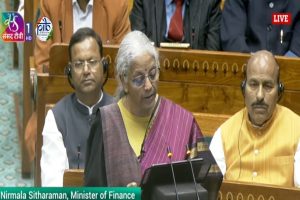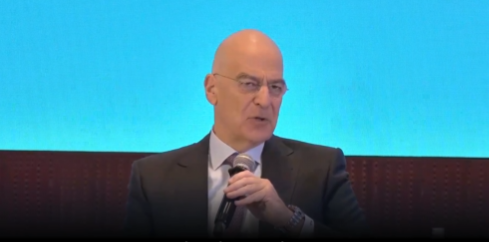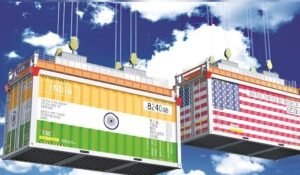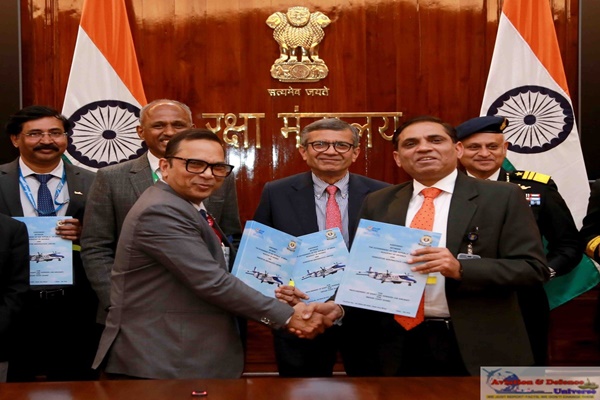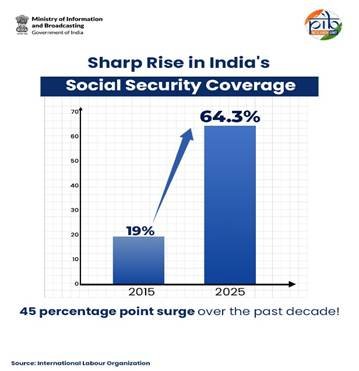
Last Updated on June 29, 2025 10:08 am by BIZNAMA NEWS
Staff Reporter
India has recorded a major achievement in social protection, expanding its social security coverage from just 19% in 2015 to 64.3% in 2025, according to data released by the Press Information Bureau (PIB). This represents a dramatic 45-percentage-point increase over the past decade, bringing more than 94 crore individuals under at least one form of social protection benefit.
This progress has been formally acknowledged by the International Labour Organization (ILO), with updated figures published on its ILOSTAT database, positioning India as the second-largest country globally in terms of beneficiaries — behind only China.
As defined by the ILO, social security guarantees healthcare and income support during periods of old age, sickness, disability, unemployment, maternity, or loss of a family breadwinner. India’s broad social security net includes social insurance, direct welfare transfers, and in-kind benefits such as subsidized food and shelter.
A major factor driving this success is a national data integration effort led by the Ministry of Labour and Employment in partnership with the ILO. The initiative uses encrypted Aadhaar IDs to pool beneficiary data across 34 central welfare schemes, including MGNREGA, EPFO, ESIC, and PM-POSHAN.
Launched on March 19, 2025, the data pooling project’s Phase I covers ten states, including Uttar Pradesh, Rajasthan, and Maharashtra. Once Phase II incorporates additional schemes and states, officials estimate the total number of verified beneficiaries could surpass 100 crore.
This expansion is driven by the government’s pro-poor and labor welfare initiatives over the past 11 years, underpinned by simplified legislation and robust digital infrastructure. The codification of 29 labor laws into four Labour Codes—Wage Code, Social Security Code, Occupational Safety, Health and Working Conditions Code, and Industrial Relations Code—has extended protections to the unorganized sector, which constitutes nearly 90% of India’s 50 crore workers. The Social Security Code, 2020, ensures benefits like insurance, pension, gratuity, and maternity support, with contributions from employers and workers, and government funding for disadvantaged sections. Key provisions include expanding ESIC benefits to all sectors, establishing a social security fund for unorganized workers, and introducing a Universal Account Number (UAN) for seamless benefit portability.
Digital and financial inclusion has been pivotal. Over 55.64 crore Jan Dhan accounts as of June 18, 2025, have enabled direct benefit transfers, saving ₹3.48 lakh crore by March 2023. With 142 crore Aadhaar cards issued by June 27, 2025, and 5G connectivity reaching 99.6% of districts, digital access has become affordable and widespread, with data costs dropping from ₹308 per GB in 2014 to ₹9.34 in 2022.
Key schemes driving this transformation include the Pradhan Mantri Suraksha Bima Yojana (PMSBY), enrolling 51.06 crore people for accident insurance, and the Pradhan Mantri Jeevan Jyoti Bima Yojana (PMJJBY), covering 23.64 crore individuals with life insurance. The Pradhan Mantri Shram Yogi Maandhan Yojana (PM-SYM) provides pensions to 51.35 lakh unorganized workers, while the e-Shram portal has registered 30.91 crore workers, 53.77% of whom are women. The Atal Pension Yojana (APY) supports 7.25 crore subscribers, and the PM Vishwakarma Yojana has empowered 23.7 lakh artisans with loans and toolkits.
Women’s empowerment is a priority, with the Lakhpati Didi initiative aiming to transform 3 crore Self-Help Group women into high earners. The PM Ujjwala Yojana has provided over 10.33 crore free LPG connections, enhancing health and dignity. The Pradhan Mantri Awas Yojana (PMAY) has delivered nearly 4 crore houses, with 92.72 lakh urban homes and 2.77 crore rural homes, 25.29% registered to women.
Health and food security have also advanced. Ayushman Bharat has issued 41.29 crore health cards, offering up to ₹5 lakh in insurance, while the Ayushman Vay Vandana scheme extends coverage to seniors above 70. The Pradhan Mantri Garib Kalyan Anna Yojana (PMGKAY) has ensured food security for 80.67 crore people. For marginalized groups, the ADIP scheme has provided assistive devices to 31.16 lakh persons with disabilities over 11 years, and the SMILE scheme supports transgender individuals through 12 pilot Garima Greh shelter homes.

